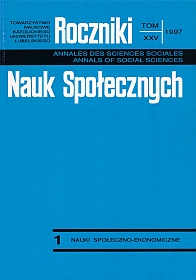Godność osoby ludzkiej czy prawo naturalne podstawą praw osoby ludzkiej w ujęciu Jacquesa Maritaina
Abstrakt
It is true that Maritain writes that natural law (la loi naturelle) is the foundation of human rights, yet he proves that rights are natural rights in the strict sense of the term, whereas others are necessarily bound with it, and yet others are bound only in a contingent manner. The French philosopher considered natural law at two levels: ontological and cognitive. The human being possesses, likewise all other living creatures, a unique structure and goals, a normal way of its functioning (normalité de son foncionnement) - law. The goals are as follows: maintenance of existence and development. For man this law bears a moral character, for man is person, i.e. a rational, free being that has conscience, and he is the master of his own acts. Maritain calls this right a non-written law (la loi non écrite). Now in the ontic fabric of man reside goods which are his due: existence (life) and freedom. Apart from these goods he is entitled to the rights: to life and freedom. In this ontic fabric resides a natural inclination to maintain life, to give life, and to develop. One may maintain one’s existence and reach integral development by acquiring other goods and fulfilling good deeds (working). He, too, has the duty to do good, without which he will fail to maintain his existence and will not reach his goal. Following St Thomas, Maritain lays down the first principle of natural law: do good and avoid evil acts. In this principle reside the most fundamental rights and duties of the human person. It is characteristic of its interpretation that it puts rights before duties. Either of them has a personal and social aspect. The foundation of natural law is the dignity of the human person. Dignity is a metaphysical absolute value, residing in the ontic fabric of person. The core of dignity is in the soul of man, who was created in the likeness of God (imago Dei). Maritain writes: „The dignity of the human person is a word which denotes nothing, if it does not mean that the person of his or her own natury possesses [...] rights”. To know natural law - its gnoseological aspect - is a different problem. It is known spontaneously, in a nonreflective manner, and progressively as regards the degree of civilizational development of mankind, which is pinpointed by ethnology and history of societies. It was exposed to the hazard of errors just as in all other affairs, due to the fact that human reason is imperfect. However, the sound line of moral experience of the binding power of natural law was still developed and will further be developed. Following St Thomas, Maritain lists natural law, the law of nations (ius gentium), the positive revealed Divine law and (established) human law. He incorporates natural law known by way of reflection, and not spontaneously by inclination, within ius gentium and calls it the common law of civilisation (la loi commune de la civilisation). Now ius gentium is linked with natural law in a necessary manner, whereas human law is linked with it only conditionally and contingently. The author of paper proposes to call human law the law of culture. Following the above division, Maritain gives three groups of human rights: rights which belong to natural law, to ius gentium and to positive law. The rights of the human person which belong to natural law and ius gentium are inalienable, unforfeitable - absolute, yet in the aspect of their being granted to human beings. In the aspect, however, of their application they do not have the character of absolute rights, for the human person is a little god. Maritain has also given a different division of human rights: the rights of the human person as such (droits de la personne humaine comme telle), the rights of the civil person (droits de la personne civique), and the rights of the social person, in particular the working person (droits de la personne sociale, et plus particulièrement de la personne ouwrière). Speaking about the rights of the social person, he lists the rights of the people fulfilling some social, economic and cultural functions: producers, consumers, technicians, creators of culture and science. There is still a debate about the right to work, and some Catholic authors negate it, yet Maritain recognizes this right as a basic right and ranks it first among the rights of the person-labourer. He predicted that along with the progress of economic organization a new right to the title of labour (au titre de travail) would be read out, a right which he also called the title of labour (le titre de travail). Not only does the title of possessing property entitle one to manage enterprise, but also to have the title of labour. He pointed to the necessity to take up reform of capitalism and to shape a new socio-economic order. This order should be an order of the aristocracy of labour, that is such in which social, economic and political life will be run by people who are best in their job. To put this regime into effect requires a „moral revolution”.
Copyright (c) 1997 Roczniki Nauk Społecznych

Utwór dostępny jest na licencji Creative Commons Uznanie autorstwa – Użycie niekomercyjne – Bez utworów zależnych 4.0 Międzynarodowe.


